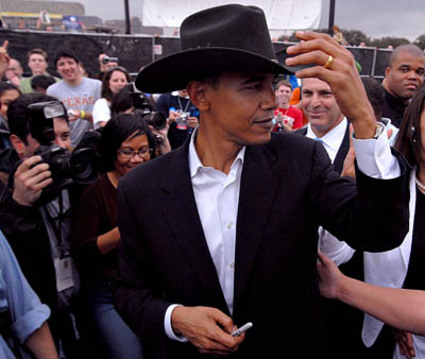Obama Won Texas
 A week after Hillary Clinton revived her campaign with media reports of her wins in Ohio and Texas, we get official word that Barack Obama actually won Texas.
A week after Hillary Clinton revived her campaign with media reports of her wins in Ohio and Texas, we get official word that Barack Obama actually won Texas.
Illinois Sen. Barack Obama has won the Texas Democratic caucuses and will get more delegates out of the state than his rival, Sen. Hillary Clinton, who won the state’s primary, according to CNN estimates.
Under the Texas Democratic Party’s complex delegate selection plan, Texas voters participated in both a primary and caucuses on March 4. Two-thirds of the state’s 193 delegates were at stake at the primary, while the remaining third were decided by the caucuses.
An additional 35 superdelegates were not tied to either contest. Clinton, of New York, defeated Obama in the primary by a 51-47 percent margin. But results of the caucuses were up in the air on election night and for several days afterward, due to state party rules that did not require local caucus officials to report their results to a centralized location.
Partial caucus results, representing 41 percent of all caucus precincts, showed Obama last week with 56 percent of the county-level delegates chosen at the caucuses to 44 percent for Clinton. The state party says it will not be able to provide a further breakdown of the caucus results from March 4.
The news isn’t any surprise; indeed, I had it in my day-after postmortem. Most of the political reporters covering the race had to know this was the likely outcome, too. Yet the coverage focused on Hillary Clinton’s “Energizing Victory.” The Obama camp won’t be able to roll back the momentum at this point.
This simply reemphasizes the fact that, while the contest is ostensibly about getting more delegates at the national convention — and ultimately it is — the real race is about public perception, which depends on media coverage. Because of the proportional allocation of delegates, neither candidate makes much progress with “wins” in closely fought states. But the false perception that Obama was running away with the contest after a series of narrow wins in small states was altered with the false perception that Clinton won both Ohio and Texas.
Photo credit: Texans for Obama via Google





Does this mean that Texas is now an insignificant state?
I am having fun seeing how many ways the democratic party can find to nominate their candidate in a non democratic fashion (defined as one man one vote).
In Texas, a voter in Austin was the equivalent of about three voters in Houston. The popular vote, held over several weeks with the early voting system, favors one candidate. But those results are nullified by seeing how many supporters you could get into a room at a specific time and how many of your opponent supporters you could get to leave the room.
This is all within the rules as set up before hand. It isn’t that this is new, it is just the walls of the sausage factory has fallen down and people are seeing what goes on. Of course this all pales in comparison to the back room deals that are going to be made in buying delegates (super or regular) come the convention.
A good question to ask someone on the left is if the democrats were forced to hold these undemocratic nomination contests by the republicans, wouldn’t they be rioting in the street? But since it is being forced on them by their party leadership they act like good little sheep and just buck in the pen when their candidate gets gored. It is to laugh.
And yet the Republican winner-take-all process is somehow closer to “one man one vote”?
Michael,
Yes. We don’t say that people in one town get 3 votes and those in another get 1. At the end of the election for that state, the people in the state have collectively chosen one candidate. That is a reflection of how the countries EV system works. You may not like the EV system, but it is how we as a country have set up our democracy to balance big state vs small state interests.
Everybody in Texas gets one vote in the primary, nobody gets 3. Moreover, Texas went out of their way to allocate the same delegate/voter ratio across the state, most don’t do that. So they are closer to one man one vote that most.
You may not like the Texas democratic primary allocation system, but it is how they as a state party set up their democratic primary to balance high-turnout vs low-turnout areas.
yaj,
There is some sense to it, if you are allocating votes by districts, as most states with proportional representation do whether R or D.
If Houston, a far more red area, and Austin, a far more blue area, each received delegates based on total population then Houston democrats would get a proportionally larger voice in the nominating process. The Texas system attempts, perhaps imperfectly, to correct for this. You of course understand all of this, but would prefer to try and make hay out of this rather than acknowledge the underlying cause.
The Republican winner take all format has at times disenfranchised a majority of the voters when a candidate wins a plurality (not majority of the vote) and collects all of the delegates. McCain’s home state of Arizona is one example.
Suffice it to say that both nominating processes fall short of the one man, one vote, and a pure majority of the nations R or D voters decide the nominee. Perhaps you should care for your own glass house before throwing stones.
Anyone else immediately reminded of “Blazing Saddles” by that photo?
I’ll grant you small (some medium) states (and territories), but narrow wins?
Hawaii – 76,24
Wisconsin – 58,41
DC – 75, 24
Maryland – 60, 37
Virginia – 64,35
Maine – 59,40
Louisiana – 57,36
Nebraska – 68,32
Virgin Islands – 90,08
Washington – 68,31
Alabama – 56,42
Alaska – 74,25
The smallest margin was 14 points. How big would the victories have to be for you to call them blow outs?
What do Clinton’s margins look like?
“narrow wins” ??
James you are getting pretty darned fact challenge. Fist reporting Spitzer resigned way ahead of time, now this. I often disagree with you, but I don’t think of you as someone who simply makes things up for stories. You going Fox on us?
Michael,
Talk to grewgills. He at least understands what I mean when I say that Austinites get the equivalent of three votes to a Houstonians one vote. You are right that each gets one vote, but one vote from an Austinite goes to getting 3 delegates and the Houstonian vote goes to 1 delegate.
You are right that this is the rule (and the democrats can set up whatever system they desire), but there system is looking backwards not forward. You can defend it all you want, but even Austinite liberals here in Texas recognize how undemocratic the system is.
Grewgills,
I understand the reasoning. I think it is backward looking. If a new candidate who brings in new voters (e.g. the independent voters in Texas who have abandoned the democrats at the state level), then the party rules don’t encourage the crossover candidate by prioritizing delegates to the last election voting pattern.
I agree that the republican system is not perfect. But it is closer to the general election voting system. The democratic system is much farther from the general election system. So while I agree that you can point out differences between the general election system, republican system and democratic system from a perfect ideal, that is not the point. This is a continuum and the republican system is closer to the general election system than the democratic.
And as Grewgills pointed out, that is because Austin had a larger democratic turnout than Houston did in previous elections, so instead of allocating delegates based on population of a senate district, they based it on the number of voting Democrats in the district.
This was what I was implying in my post, but unlike Grewgills, I made the assumption that you understood why it worked this way and didn’t need an explanation.
How about “LeRoy Rodgers.”
So Michael,
If in 2008 we allocated more EV for those states who supported the party of the last president in 2004, you would think that would be closer or farther from one man-one vote democracy?
By the democratic party way of dividing up delegates, it is fine. Personally, I think it would be moving away from one man-one vote and putting you in a cycle of constantly looking back to the last election (where in Texas, the democrats failed to get any state wide offices for the third time in a row). I think the caucuses (republican or democrat) also move you away from the one man-one vote principle. I’m not saying the democrats can’t run their nomination process anyway they want. I am saying that they have a less democratic way of doing it that the republicans.
That is far from an equivalent principal and you know it. For a closer analogy, we could look to the electoral college and base electoral college numbers on previous voter turnout rather than total state population. That could end up moving us closer to one man one vote for the presidency if turnout remained static or perhaps further away if turnout was erratic but whichever way you slice it, it does not turn out to one man one vote when deciding the R nominee, the D nominee, or the election of the eventual president. So far this cycle, judging by delegate totals relative to % of vote received, the Democrats are far closer to that standard.
Look to the vote totals, percentages, and the delegates awarded in the primary.
Dem
HRC 1,459,814………..50.9%………..65
BHO 1,358,785………..47.4%………..61
Rep
JM 709,477………………51.2%……….121
MH 523,554……………..37.8%………..16
RP 69,954………………….5.1%……………0
MR 27,624………………….2.0%……………0
The % of Texans that voted for Clinton almost exactly matches her % of the delegate total (off by 88% of the delegates. It looks to me like the 48.8% of R Texans who voted against McCain were more disenfranchised than were any Texas democrats. If we are scoring by most voters stripped of their voice in the nominating process, then the republican way of doing things in Texas and other winner take all states is far less democratic.
All that being said, this is a rather silly pissing contest.
BTW, does it bother you that Austin republicans get a greater voice than do Houston republicans in deciding who gets the nomination?
You are only giving part of the picture.
DEM HRC 50.9% BHO 47.4%
Delegates
HRC 94 delegates, BHO 99 delegates
So the one who got the most votes got the fewest delegates. Wasn’t that a big part of the “Bush stole the 2000 election” meme from the left?
yaj,
First, its nice to see that you are not contesting the rest of what I said.
The whole 1/3 caucus 2/3s primary breakdown is a little odd but not undemocratic.
Still, does it not bother you that Austin republicans got a bigger voice than Houston republicans, or is your outrage only directed to the left?
Strawman, and you know it. As Grewgills pointed out, a better analogy would be basing EV votes on turnout for _any_ presidential candidate, which would indeed be closer to one man one vote. If you don’t like basing EVs based on past-voting, we can always delegate them based on current voting, but at that point you may as well just base the winner on the national popular vote.
Also a strawman and you know it. You know the delegate counts cited are for the primary+caucus, and you know the percentages cites were from the primary only. Are you just desperate to defend your original criticism, or do you just think we’re all that stupid?